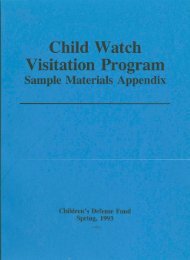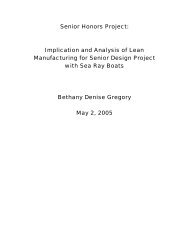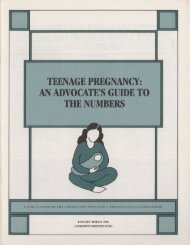children out of school in america - University of Tennessee Digital ...
children out of school in america - University of Tennessee Digital ...
children out of school in america - University of Tennessee Digital ...
You also want an ePaper? Increase the reach of your titles
YUMPU automatically turns print PDFs into web optimized ePapers that Google loves.
Truancy<br />
Laws penaliz<strong>in</strong>g <strong>children</strong> and their parents for<br />
truancy have existed for over a hundred years. Written<br />
when this country was young and unformed,<br />
they represented harsh we3pons to force disparate<br />
people to observe the law. Attitudes aga<strong>in</strong>st immigrants<br />
or the lower classes <strong>of</strong>ten were captured <strong>in</strong><br />
the debates <strong>of</strong> these laws. For example, the Secretary<br />
<strong>of</strong> the State Board <strong>of</strong> Education <strong>in</strong> Connecticut<br />
<strong>in</strong> 1872 argued:<br />
It is largely through immigration that the number<br />
<strong>of</strong> ignorant, vagrant and crim<strong>in</strong>al y<strong>out</strong>h has recently<br />
multiplied to an extent truly alarm<strong>in</strong>g <strong>in</strong><br />
some <strong>of</strong> our cities. Their depravity is sometimes<br />
defiant and their resistance to moral persuasion is<br />
obst<strong>in</strong>ate. When personal effort and persuasion<br />
and organized benevolence have utterly failed,<br />
let the law take them <strong>in</strong> hand tirst to the public<br />
<strong>school</strong>, and if there <strong>in</strong>corrigible, then to the Reform<br />
School. Those who need education most<br />
and prize it least are fit subjects for coercion....24<br />
And <strong>in</strong> [909, New York's legislature amended its<br />
compulsory attendance law to <strong>in</strong>clude the follow<strong>in</strong>g<br />
section:<br />
Arrest <strong>of</strong> Truants - I.. The attendance <strong>of</strong>ficer<br />
may arrest with<strong>out</strong> a warrant any child between<br />
seven and sixteen years <strong>of</strong> age and who is a truant<br />
from <strong>in</strong>struction upon which he is lawfully required<br />
to attend with<strong>in</strong> the city or district <strong>of</strong> such<br />
attendance <strong>of</strong>ficer. He shall forthwith deliver the<br />
child so arrested to a teacher from whom such<br />
child is then a truant, or, <strong>in</strong> the case <strong>of</strong> habitual<br />
and <strong>in</strong>corrigible truants, shall br<strong>in</strong>g them before<br />
a police magistrate for commitment. ...25<br />
Generations later. the thrust <strong>of</strong> truancy laws are<br />
the same, although the language may have s<strong>of</strong>tened<br />
somewhat over the years. There are still laws<br />
threaten<strong>in</strong>g recalcitrant <strong>children</strong> and parents with<br />
stiff punishment if a child is truant. 26 This has led<br />
to crim<strong>in</strong>al treatment <strong>of</strong> some parents and <strong>children</strong>.<br />
We question the effectiveness <strong>of</strong> these sanctions to<br />
compel <strong>school</strong> attendance.<br />
First, our survey data show that an overwhelm<strong>in</strong>g<br />
24 Bremner et al. (Ed,,) Chi/drell alld Y<strong>out</strong>h ill America<br />
(Cambridge: Harvard <strong>University</strong> Press. 1971) p. 142l.<br />
"' Bremner. pp, t427-1428,<br />
26 See Appendix J.<br />
62<br />
majority <strong>of</strong> parents do not need threats to favor compulsory<br />
attendance laws.<br />
The reasons for endors<strong>in</strong>g the laws are varied.<br />
Parents see <strong>school</strong>s as access r<strong>out</strong>es to better jobs<br />
and upward mobility, as teach<strong>in</strong>g literacy and enhanc<strong>in</strong>g<br />
self-worth, as help<strong>in</strong>g their <strong>children</strong> fight<br />
discrim<strong>in</strong>ation, and as places were <strong>children</strong> can safely<br />
be kept <strong>of</strong>f the streets. A Portuguese mother who<br />
f<strong>in</strong>ished fourth grade <strong>in</strong> Portugal and who now lives<br />
<strong>in</strong> Massachusetts says: "[The] law keeps them from<br />
be<strong>in</strong>g able to quit to work when kids might want to<br />
and this is good." A father whose parents pulled<br />
him <strong>out</strong> <strong>of</strong> <strong>school</strong> to work said he had felt this "limited<br />
opportunity <strong>in</strong> the job market." A Chicano<br />
mother <strong>of</strong> three <strong>in</strong> Denver said: "If they would have<br />
made me go to <strong>school</strong>, it would have been better. I<br />
told my kids, 'the day you decide to quit, you'd better<br />
have a job and an apartment <strong>of</strong> your own.' "<br />
Second, even if means were needed to prod <strong>children</strong><br />
and parents <strong>in</strong>to compliance with the law, it<br />
does not at all follow that crim<strong>in</strong>al proceed<strong>in</strong>gs or<br />
severe discipl<strong>in</strong>ary actions like suspension or expulsion<br />
serve this purpose well,<br />
Truancy <strong>in</strong> some cases simply is a child's way <strong>of</strong><br />
say<strong>in</strong>g he or she does not like <strong>school</strong>. The reasons<br />
for such distaste can be many. If <strong>school</strong>s cared<br />
ab<strong>out</strong> effectively teach<strong>in</strong>g all their students, truancy<br />
would be seen as an act which triggered <strong>in</strong>vestigation<br />
<strong>in</strong>to why a child was not <strong>in</strong>terested <strong>in</strong> and benefit<strong>in</strong>g<br />
from his present educational program. Steps then<br />
might be taken to improve the relationship between<br />
<strong>school</strong> and child.<br />
Truancy can also be the child's way <strong>of</strong> handl<strong>in</strong>g<br />
other personal problems: tattered cloth<strong>in</strong>g, dependent<br />
parents or sibl<strong>in</strong>gs, health problems. The attendance<br />
supervisor <strong>in</strong> Holyoke, Massachusetts has<br />
found a boy or girl absents himself or herself because<br />
<strong>of</strong> a serious case <strong>of</strong> body lice. 27 In these <strong>in</strong>stances,<br />
punishment seems entirely <strong>in</strong>appropriate.<br />
Rather, the <strong>school</strong> needs to f<strong>in</strong>d <strong>out</strong> ab<strong>out</strong> and alleviate<br />
the conditions which bar <strong>children</strong> from attend<strong>in</strong>g<br />
<strong>school</strong>.<br />
Our <strong>in</strong>terviews have led us to believe that, like<br />
27 Richard Golden, "Report on Truancies" (Holyoke School<br />
Board. February, 1973),














